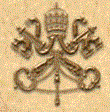

For conveniece of reference, this page is organized alphabetically according to the mystic's name. The division is completely artificial, seperating mystics who worked together, so it is recommended that one review the entire page before skipping around.
For a vast selection of other Christian texts, visit the Christian Classics Etheral Library or Catholic First.
St. Benedict, OSB
St. Catherine of Sienna
A Doctor of the Church, St. Catherine of Sienna is one of the most revered theologians of the Church. A nun who was an advisor to the Pope, she was also known for her visions. The Dialogue was dictated while in such an ecstatic state.
St. Ignatius of Loyola, S.J.
While recovering from a canon injury, Ignatius of Loyola studyied the lives of Christ and the saints. Deciding the saints' examples were worth following, he began his life-long spiritual quest. On the way he founded the Society of Jesus (the Jesuits), the largest order of the Church. He also wrote The Spiritual Exercises, a classic work of Catholic spirituality.
St. John of the Cross, OCD (1542-1591)
One of the first Discalced (Shoeless) Carmelites, a reform of the Carmelite Order, St. John of the Cross composed a number of works on Catholic spirituality, most famously his poem and commentary The Dark Night of the Soul (actually a sequal to his Ascent of Mount Carmel). His works were the subject of Pope John Paul II's doctoral thesis.
Thomas Keating
A Trappist monk, Thomas Keating and others developed Centering Prayer as a way of combining Eastern meditation techniques with Catholic prayer. His most famous text on Centering Prayer is Open Mind, Open Heart. Many parishes have Centering Prayer groups and conduct retreats -- contact your local church for details.
M. Basil Pennington, O. C. S. O.
St. Teresa of Avila (1515-1582)
A Carmelite reformer, St. Teresa organized the Discalced Carmelites in her battle against laxity in monastic communities. She is also famous for her writings on the Interior Castles, stages one passes through in the process of spiritual growth.
Thomas à Kempis (1380-1471)
An Augustinian monk, Thomas à Kempis is famous for his landmark Imitation, a simple book of reflections and practices designed first to purge one of vices, and then to draw one to God.